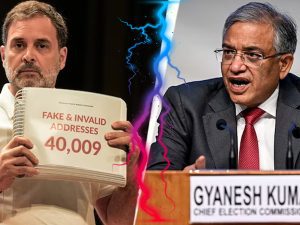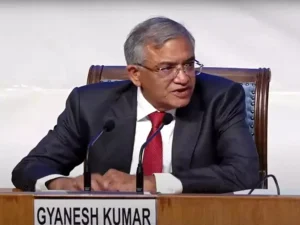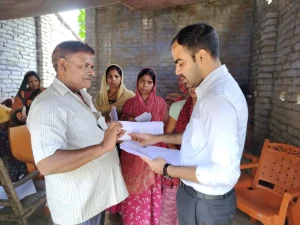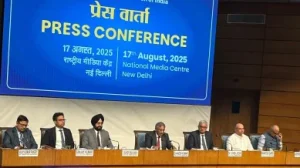New Delhi – Chief Election Commissioner Gyanesh Kumar delivered a strong rebuke to Congress leader Rahul Gandhi during his first major press conference since assuming office in February 2025. CEC Gyanesh Kumar On Vote Chori allegations made by Gandhi has sparked a constitutional controversy, with the Election Commission chief demanding either a signed affidavit or a public apology within seven days.
The confrontation emerged as Gandhi launched his 1,300-kilometer ‘Voter Adhikar Yatra’ from Bihar’s Sasaram, intensifying the Opposition INDIA bloc’s campaign against alleged electoral malpractices. This timing made CEC Gyanesh Kumar On Vote Chori response particularly significant for India’s democratic discourse.
Strong Constitutional Defense Against Allegations

CEC Gyanesh Kumar On Vote Chori claims emphasized India’s status as the world’s largest democracy, highlighting the nation’s massive electoral infrastructure involving over 90 crore voters, extensive election official networks, and comprehensive voting systems. Kumar characterized Gandhi’s allegations as a direct insult to both the Constitution and the credibility of millions of Indian voters.
“You will have to sign an affidavit or apologise to the nation. There is no third option,” Kumar declared emphatically. His statement regarding CEC Gyanesh Kumar On Vote Chori allegations included a clear seven-day deadline, stating that failure to provide an affidavit would prove the allegations baseless.
The commissioner’s response demonstrated the Election Commission’s zero-tolerance approach toward unfounded accusations that could undermine public confidence in India’s democratic processes.
Detailed Analysis of Duplicate Voter Allegations


CEC Gyanesh Kumar On Vote Chori explanation addressed specific concerns about duplicate EPIC (Electoral Photo Identity Card) numbers that Gandhi had raised. Kumar provided comprehensive clarification about two distinct types of duplication issues that the Election Commission has systematically addressed.
The first type involves different individuals in separate states sharing identical EPIC numbers due to system errors. Kumar revealed that approximately three lakh such cases were identified and resolved by March 2025, with affected EPIC numbers being changed to ensure uniqueness.
The second duplication category involves single individuals appearing on voter lists in multiple locations with different EPIC numbers. CEC Gyanesh Kumar On Vote Chori response emphasized the Election Commission’s ongoing efforts to identify and eliminate such discrepancies through comprehensive verification processes.
CCTV Footage and Privacy Concerns
Addressing demands for CCTV footage, CEC Gyanesh Kumar On Vote Chori discussion highlighted critical privacy considerations. Kumar questioned the ethics of sharing surveillance footage involving voters’ family members, including mothers, daughters-in-law, and daughters, without their explicit consent.
The commissioner noted instances where voter photographs were presented to media outlets without permission, leading to public allegations against innocent citizens. This aspect of CEC Gyanesh Kumar On Vote Chori response emphasized the Election Commission’s responsibility to protect voter privacy while maintaining electoral transparency.
Bihar Special Intensive Revision Process


CEC Gyanesh Kumar On Vote Chori commentary extensively covered the Special Intensive Revision (SIR) exercise in Bihar, which hasn’t been conducted for over twenty years. The SIR process aims to purify voter lists by removing invalid entries and adding legitimate voters who may have been excluded.
Also Read: PM Modi Independence Day Speech Announces New GST Reforms & Youth Jobs
Kumar emphasized that over 1.6 lakh Booth Level Agents from all political parties participated in preparing the draft SIR list, with their signatures verifying the process. This collaborative approach demonstrates the inclusive nature of electoral reforms, contradicting CEC Gyanesh Kumar On Vote Chori allegations about partisan manipulation.
The SIR exercise generated 28,370 claims and objections from voters, indicating active public participation in the verification process. Kumar stressed that more than seven crore Bihar voters support the Election Commission, making questions about electoral credibility unfounded.
Machine-Readable Voter Lists and Legal Compliance
CEC Gyanesh Kumar On Vote Chori presentation clarified the distinction between machine-readable and searchable voter lists. Following a 2019 Supreme Court judgment, machine-readable voter lists remain prohibited due to privacy concerns, while searchable lists are available on the Election Commission website.
This technical explanation addresses misconceptions about voter data accessibility while ensuring compliance with Supreme Court directives regarding citizen privacy protection.
Constitutional Citizenship and Voting Rights
Kumar reinforced that only Indian citizens possess voting rights for MP and MLA elections, addressing concerns about non-citizens appearing on voter rolls. CEC Gyanesh Kumar On Vote Chori explanation outlined the verification process during SIR, where individuals must prove their nationality through appropriate documentation.
Non-citizens who may have inadvertently been included in voter lists will have their names removed following thorough investigation, ensuring electoral integrity while protecting legitimate voters’ rights.
Transparent Electoral Process Defense


CEC Gyanesh Kumar On Vote Chori defense highlighted the massive human infrastructure supporting elections, including over one crore employees, more than ten lakh booth level agents, and over twenty lakh polling agents representing various candidates during the 2024 Lok Sabha elections.
Kumar questioned how vote theft could occur under such extensive supervision and transparent processes, emphasizing that allegations against this comprehensive system essentially accuse millions of election workers of complicity.
Constitutional Duty and Political Neutrality
Concluding his comprehensive response, CEC Gyanesh Kumar On Vote Chori statements reaffirmed the Election Commission’s constitutional mandate to treat all political parties equally. Kumar emphasized that since political parties are registered through the Election Commission, discriminatory treatment would be constitutionally impossible.
The commissioner’s final message stressed the Election Commission’s unwavering commitment to constitutional duty regardless of political pressures, positioning the institution as a guardian of democratic integrity against unfounded allegations that could damage public trust in India’s electoral system.

